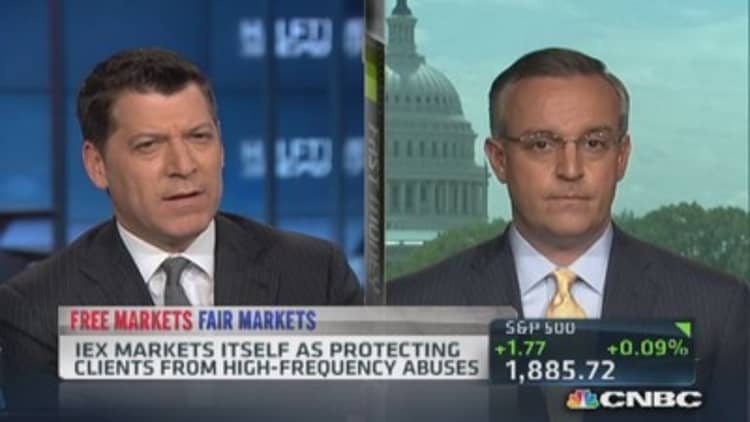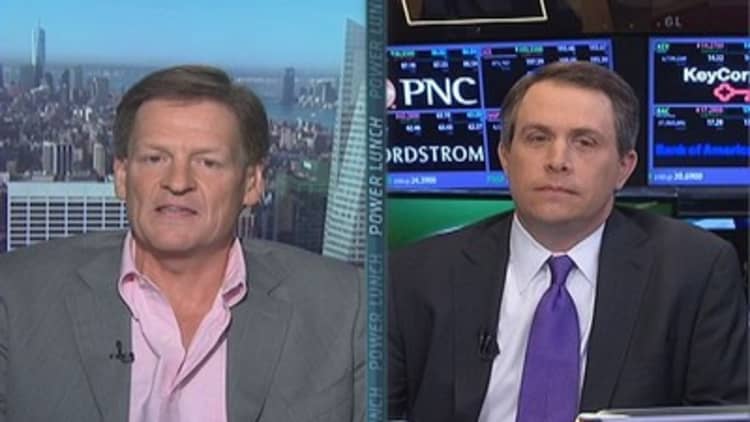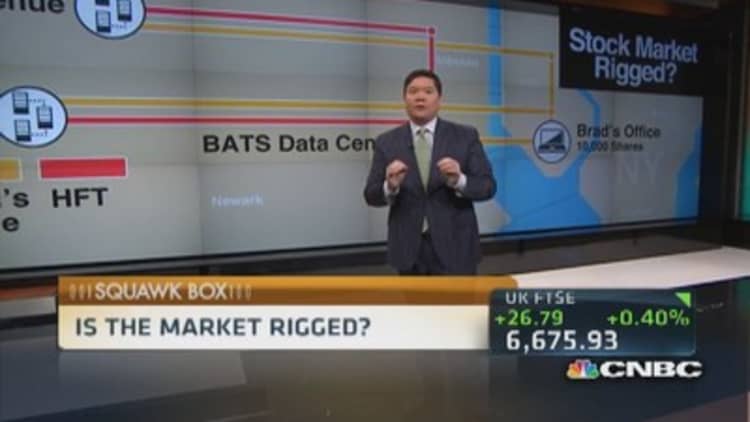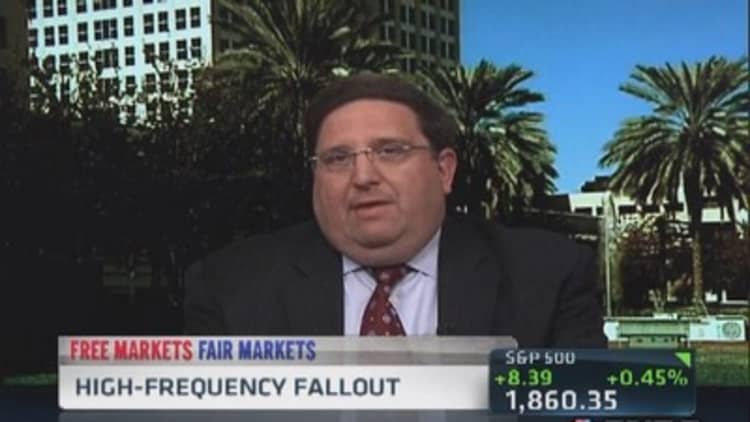
The popular brokerage firms Fidelity Investments and Scottrade have sent letters to clients declining to route stock trades through IEX, the new trading platform featured in Michael Lewis' book "Flash Boys" as the antidote to high-speed trading, according to documents reviewed by CNBC.
The letters reviewed by CNBC came in response to written requests from the clients to route their trades to IEX. In their responses, Fidelity and Scottrade offered different reasoning but both declined to route all of a customer's trades to IEX. In the case of Scottrade, the brokerage wrote that it was unable to comply with the client's request because it does not have a relationship with IEX.
IEX markets itself as a venue that protects individual investors from high-frequency traders who have co-located computers inside other stock exchanges that offer direct feeds to high-frequency trading firms.
The two clients who sent their correspondence to CNBC said they were concerned about high- frequency trading and wanted to route their trades to IEX, where they felt they would be less at risk from faster competitors in the market.
One of the clients, David Navari of Maryland, said that he thinks payment for order flow, in which firms receive cash from exchanges in return for routing orders there, has clouded the decision-making of his broker, Fidelity Investments.
Read More David Einhorn takes stake in HFT-antidote IEX
"It is illegal for a brokerage to front run my trades based on knowledge of my order, but currently it is not illegal for the brokerage to sell my trades to market makers who can profit by filling my order with a stale price knowing that the market has already moved based upon direct feeds from the exchanges," Navari told CNBC. "And then to make matters worse, the brokerage has the gall to deny my instructions to direct my trades to venue of my choice so I can prevent this."
Client requests to direct orders to a particular trading venue can put brokers in an awkward position. Typically regulations require them to find the best deal for their clients, and at any given moment that best deal may not be available on IEX. Still, the regulator who oversees the issue says the rules are clear: Brokers who have access to the exchange should route the customers' trades there if the customers ask, even if it means getting a worse financial deal for the customer. What's more, brokers are advised to constantly seek out connections to new trading venues so they can ensure they are getting best execution on trades.
FINRA, the independent securities regulator, says its rule 5310 offers clear guidance to brokers dealing with customer requests to route trades. "If a customer asks a broker dealer to trade on a particular venue and it has access to that particular venue, it should execute the trade on that particular venue," said a FINRA official, who asked not to be named.
Read More
The FINRA rule states that brokers are required to trade on the venue requested by the client, and they will be deemed to have fulfilled their so-called "best execution" obligation to find the best deal for their client by doing so. "If a member receives an unsolicited instruction from a customer to route that customer's order to a particular market for execution, the member is not required to make a best execution determination beyond the customer's specific instruction," the rule states. "Members are, however, still required to process that customer's order promptly and in accordance with the terms of the order."

Nonetheless, in Fidelity's correspondence with Navari, the firm declined to execute all of his trades on IEX, citing its own software that is designed to seek the best trade execution across the variety of trading platforms in the market. "Fidelity is unable to accommodate your request to direct all of your orders to IEX," wrote Fidelity's Matthew Pliskin to Navari in a letter dated April 24. "Note Fidelity invests significantly in our trading technology and we have built a superior routing infrastructure to help benefit both our retail and institutional brokerage clients."
Fidelity's letter also explained that the firm does offer a connection to IEX, although it won't route all of the customer's trades there: "In order to protect our customers' trades and help them seek the best possible execution, Fidelity employs proprietary routing technology to send their orders to the more than 50 competing stock trading venues, including IEX, based on performance, costs, and if customers can seek the best price for their order."
In a statement to CNBC, Fidelity spokesman Stephen Austin said: "I can tell you that ensuring the safety of customer orders and getting them the best trades for their trades are top priorities at Fidelity." Austin denied that so-called "payment for order flow" affected Fidelity's decisions about where to route trades. Clients "should feel confident knowing that we do not solicit payments from market centers, and accept them only after obtaining the best price available for our customers' orders," he said. "This helps us keep customer trading commissions as low as possible."
"We comply with all rules and regulations regarding the orders we accept for execution," Austin added.

In the case of Scottrade, a client who asked not to be named received a letter in response to his request to execute trades on IEX. A Scottrade Investigation and Resolution Manager wrote: "While Scottrade does not currently have a direct relationship with IEX, we constantly monitor the execution quality of current and prospective trading centers and strive to provide the highest quality executions for client orders."
"Based on the forgoing," the Scottrade official wrote, "Scottrade respectfully declines to honor your request to route your orders to IEX."
Asked about the correspondence, Scottrade spokeswoman Lizzie Curry wrote in an email to CNBC, "Currently, Scottrade does not allow its clients to direct orders to a specific venue(s) in the marketplace. Scottrade evaluates prospective destinations on an ongoing basis in conjunction with the firm's obligation to provide Best Execution to its clients." She added that FINRA's rule 5310 doesn't apply to Scottrade because the firm does not offer direct access trading to clients. "Scottrade understands our obligations under FINRA Rule 5310," she said.
Read MoreIEX eyes stock exchange status
A spokesman for the Securities and Exchange Commission declined to comment on the correspondence between the brokers and the clients.
A spokesman for IEX also declined to comment.

Other large retail brokers are in various stages of dealing with the emergence of the new trading venue.
"The number of requests [to trade on IEX] has been quite small," said Kim Hillyer, director of communications at TD Ameritrade. She said the firm still hasn't decided whether to connect to IEX, but that if it does, customers would be able to route their trades there if they wanted to. "We're doing our homework. We take this very seriously and we want to make sure we've looked at everything before we make a final decision," she said.
A spokesman for E-Trade Financial Corp. declined to comment. But in an earnings call on April 23, E-Trade CEO Paul Thomas Idzik said, "Our ability to help our customers realize better pricing is predicated on the current market structure, where multiple trading venues, both on and off exchange attract business through incentive models, exchanging volume for improved prices, payment for order flow, and rebates," according to a transcript of the call. "With this commitment to our customers as our top priority, we vehemently condemn efforts by any market participant, high frequency or otherwise, to attempt to game the system at the cost to the retail investor."
Charles Schwab spokesman Greg Gable said the firm does not yet connect to IEX, but "we are looking into it."


